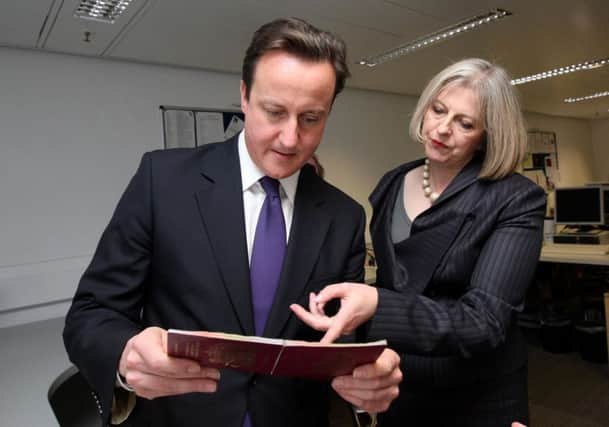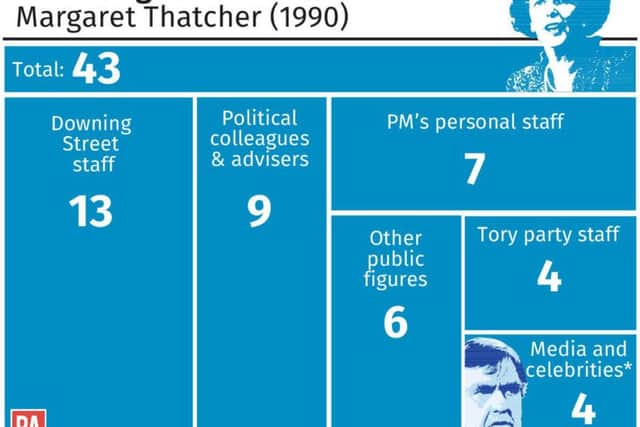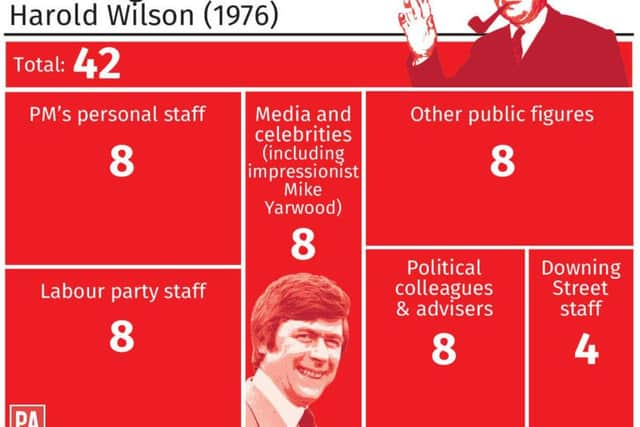The colour of money: Is Cameron's honours list really any more chummy than Harold Wilson's?


Following a leak of the list, opposition MPs demanded a complete overhaul of the system after it was claimed the former PM is pushing to reward personal aides, political donors and senior figures on the losing Remain campaign.
Mrs May was under pressure to intervene but a spokeswoman said the new premier would not interfere in decisions of the honours committees, which are independent of No 10.
Advertisement
Hide AdAdvertisement
Hide Ad“It is standard for an outgoing prime minister to submit a resignation list,” the spokeswoman said.


“The names on the list were at the former prime minister’s discretion, and they will now go through all the proper processes and committees.
“It would set a very bad precedent for a new prime minister to interfere in the official processes.”
The cronyism row was sparked by reports that Mr Cameron had recommended knighthoods for four pro-EU cabinet colleagues - Philip Hammond, Michael Fallon, Patrick McLoughlin and David Lidington.
Advertisement
Hide AdAdvertisement
Hide AdMr Cameron also requested a Companion of Honour award for George Osborne, who was dismissed as chancellor by Prime Minister Theresa May, according to the Sunday Times.


HONOURS AND DISHONOURS
The Honours system has been at the centre of several high profile scandals, which have ranged from allegations of cronyism to bribery.
• David Lloyd George.
The underhand actions of Britain’s First World War prime minister led to a law change after he was caught selling peerages and other honours in the 1920s.


Lloyd George, who led the country from 1916 to 1922, sold honours to fill Liberal Party coffers, with a barony available for £50,000, a baronetcy for £25,000 and a knighthood for £15,000, all huge sums at the time.
Advertisement
Hide AdAdvertisement
Hide AdThe OBE was introduced in 1917 and dished out to people with less money so they could get some letters after their names. This led to it being mocked as the Order of The Bad Egg.
The Honours (Prevention of Abuses) Act 1925 made it a crime to reward with “title of honour” anyone who has given “any gift, money or valuable consideration”. The only person convicted under the law was Lloyd George’s “honours broker” Maundy Gregory, in 1933.
• Harold Wilson


Wilson’s resignation honours in 1976 were dubbed the Lavender List after the colour paper some of the names were later found written on. The handwriting was that of his secretary Marcia Williams, leading to the suspicion, but no more, that she was responsible for the list.
Names included a knighthood for Joseph Kagan who was later convicted of false accounting. Another honoured was Eric Miller, who committed suicide while his business was investigated. There was also a knighthood for Wilson’s publisher, Sir George Weidenfeld.
Advertisement
Hide AdAdvertisement
Hide AdJoe Haines, who was Wilson’s press secretary, refused a peerage because he did not want to appear on a list alongside people “whom I regarded as undeserving”.
• Tony Blair
Blair became the first serving prime minister to be interviewed - three times - by police as part of a political corruption inquiry in 2006 as detectives investigated the “cash-for-honours” controversy.
The probe followed a complaint by Scottish National Party MP Angus MacNeil that financial support was being rewarded with honours.
It had been reported that millionaires who gave large donations to the Labour and Conservative parties were to be given peerages.
Advertisement
Hide AdAdvertisement
Hide AdIn 2007, after a £1.4 million, 19-month investigation, the Crown Prosecution Service announced that nobody would be charged under the Honours (Prevention of Abuses) Act, as there was no realistic prospect of a conviction.
The Hayden Phillips Review was set up to discuss reforms, with recommendations including a cap on donations and more public funding. Cross-party talks broke down without agreement.